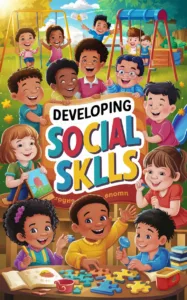
As parents, one of our primary concerns is ensuring that our children develop the necessary social skills to thrive in various environments. Social skills are crucial for preschoolers as they lay the foundation for successful interactions throughout their lives. This guide will explore effective strategies for fostering social skills in preschoolers, providing you with practical tips to support your child’s social development.
Understanding Social Skills in Preschoolers
Social skills encompass a broad range of abilities that enable individuals to interact effectively with others. For preschoolers, these skills include sharing, taking turns, listening, expressing emotions appropriately, and cooperating with peers. Developing these skills early on is essential as they contribute to a child’s emotional intelligence, self-esteem, and overall well-being.
Why Social Skills Matter
Social skills are vital for preschoolers for several reasons:
- Building Relationships: Children with strong social skills can form and maintain healthy relationships with peers and adults.
- Academic Success: Socially adept children tend to perform better academically due to improved communication and collaboration abilities.
- Emotional Regulation: Effective social skills help children manage their emotions, leading to fewer behavioral issues.
- Conflict Resolution: Preschoolers with good social skills are better equipped to resolve conflicts constructively.
Practical Tips for Developing Social Skills in Preschoolers
- Model Positive Behavior
- Children learn by observing the adults around them. Model positive social interactions by demonstrating kindness, empathy, and effective communication in your daily interactions.
- Encourage Playdates
- Arrange regular playdates with peers to give your child opportunities to practice social skills in a natural setting. Playdates help children learn sharing, turn-taking, and problem-solving.
- Role-Playing
- Engage in role-playing activities with your child to practice different social scenarios. This can help them understand how to respond in various situations, such as joining a group, asking for help, or resolving disagreements.
- Teach Empathy
- Help your child develop empathy by discussing emotions and encouraging them to consider how others might feel. Books and stories are great tools for teaching empathy.
- Provide Opportunities for Group Activities
- Enroll your child in group activities such as sports, dance classes, or art groups. These activities encourage teamwork, cooperation, and communication.
- Use Positive Reinforcement
- Praise and reward your child when they display positive social behaviors. Positive reinforcement reinforces the desired behavior and motivates your child to repeat it.
- Create a Safe and Supportive Environment
- Ensure your child feels safe and supported at home. A secure environment encourages them to express themselves and engage with others confidently.
- Set Clear Expectations
- Establish clear rules and expectations for behavior. Consistent guidelines help children understand what is expected of them in social situations.
- Read Social Stories
- Social stories are short narratives that describe social situations and appropriate responses. Reading social stories with your child can help them understand and navigate social interactions.
- Encourage Open Communication
- Foster an environment where your child feels comfortable expressing their thoughts and feelings. Open communication builds trust and helps children articulate their needs and concerns.
Common Challenges and How to Overcome Them
While developing social skills is a natural part of growing up, some preschoolers may face challenges in this area. Here are a few common issues and strategies to address them:
- Shyness: Gradually expose your child to social situations, starting with smaller, less intimidating groups. Encourage and praise their efforts to interact with others.
- Aggressive Behavior: Teach your child appropriate ways to express anger or frustration. Role-playing and social stories can be effective tools for this.
- Difficulty Sharing: Practice sharing at home through games and activities. Use positive reinforcement when your child shares willingly.
Conclusion
Developing social skills in preschoolers is a crucial aspect of their overall development. By modeling positive behavior, providing opportunities for social interaction, and using strategies like role-playing and positive reinforcement, you can help your child build strong social skills that will benefit them throughout their lives. Remember, every child is unique, so be patient and supportive as they navigate their social world.
For more tips and resources on supporting your child’s development, feel free to explore our other blog posts and parenting guides.
By following these guidelines, you can help your preschooler develop the social skills they need to succeed in school and beyond. If you have any questions or need further assistance, don’t hesitate to reach us.






